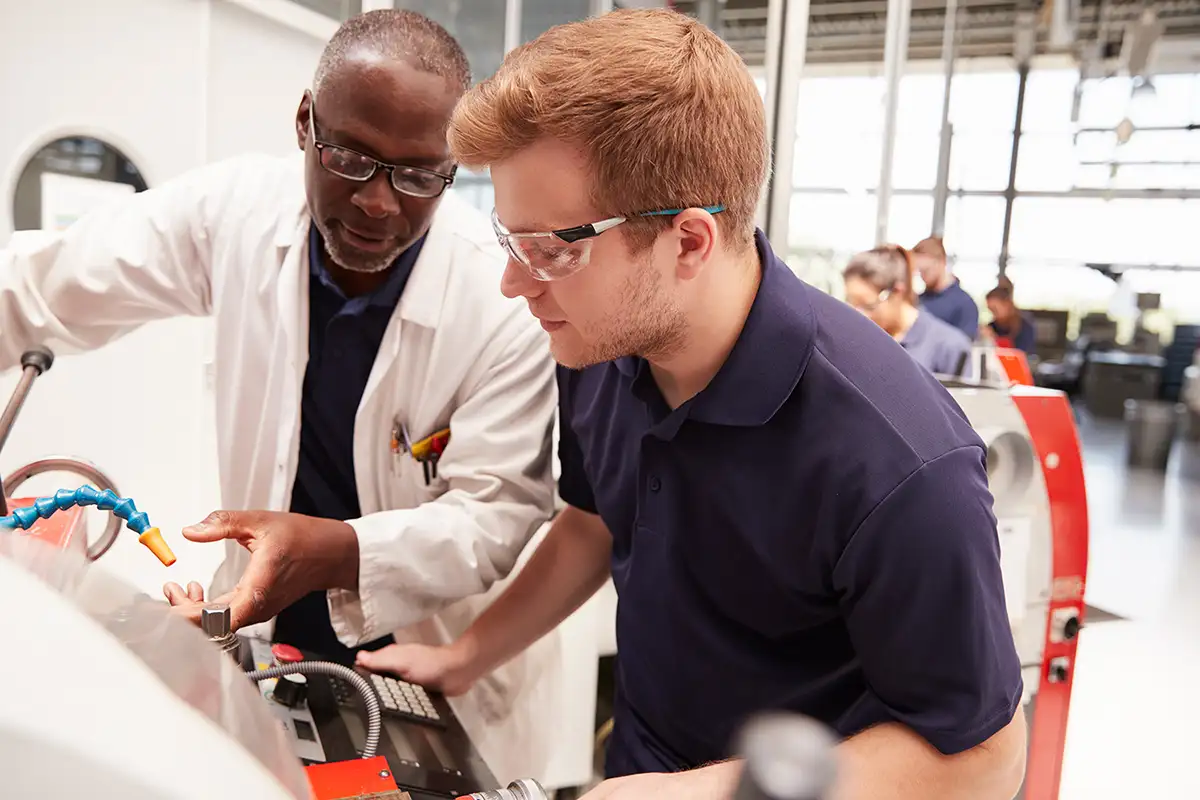Engineering GCSE Requirements: A Guide for Aspiring Engineers

June 6, 2025 | 8 months | By Career
To pursue engineering at a higher level, having the right GCSEs is essential. Typically, you’ll need a combination of science and maths subjects that provide the foundation for your studies. The core GCSE subjects required for engineering are:
- GCSE Science
- GCSE Physics
- GCSE Chemistry
- GCSE Biology
- GCSE English
These subjects equip you with the basic scientific knowledge and problem-solving skills needed for engineering. While specific GCSE requirements may vary between schools or programs, these subjects are generally recommended to prepare you for further studies in engineering.
The journey to becoming an engineer
Engineering stands as a beacon of innovation and progress, shaping the world we live in and driving the wheels of future advancements. Also, it's a career path that boasts impressive demand, growth prospects, and salary potential. In the UK alone, engineering graduates can expect to enter a market with an average starting salary of approximately £27,000, which can significantly increase with experience and specialisation to up to £150,000.
Interestingly, the journey to becoming an engineer is not one-size-fits-all. While many opt for the traditional route of pursuing an engineering degree in college, others take advantage of apprenticeship programs that combine hands-on training with study. Whichever pathway you choose, having a strong foundation in certain areas is crucial, and GCSEs are the first step to diving into the necessary knowledge for this profession.
Find out what GCSEs you need to become an engineer and how to thrive along the process!
How many GCSEs do you need for Engineering?
Embarking on an engineering career requires a solid foundation in key academic subjects. At a minimum, aspiring engineers should aim to secure five GCSEs in grades 9-4 (A*-C), including the cornerstone subjects of Maths, Science, and English. However, reaching a total of 8 GCSEs will help you build a robust profile to enter engineering university later on.
What GCSEs do you need to be an engineer?
To set the stage for a successful career in engineering, a strong grasp of Maths and Science is essential. Achieving a grade 9-4 (A*-C) in Maths, Science, and English at GCSE level is crucial. These core subjects will provide you with the essential knowledge for this career and can be integrated with several complementary options to dive deeper into the topic.
Core Subjects for Engineering GCSEs: The must-haves of any listGCSE Maths
Why is it importantGCSE Maths is crucial for engineering, providing the foundational skills in problem-solving, analytical thinking, and numerical analysis that are essential in all engineering disciplines. It lays the groundwork for more advanced mathematical concepts encountered in further education and professional practices.
Recommended levels and gradesAiming for a grade 6 (B) or higher is recommended to demonstrate a strong understanding and capability in maths.
Check our blog to find out how to revise for GCSE maths effectively.
GCSE Science
Why is it importantA solid foundation in GCSE Science equips students with a broad understanding of scientific principles and methodologies. For aspiring engineers, this knowledge is vital for understanding the physical world and the basics of material science, energy, and mechanics.
Recommended levels and gradesGrades 9-4 (A*-C) in Combined Science or individual sciences (if taken) are advisable, with higher grades reflecting a strong scientific aptitude.
Learn more about how to study for GCSE science
GCSE Physics
Why is it importantPhysics is integral to engineering, offering insights into forces, energy, and the physical laws that govern the design and analysis of everything from buildings to electrical circuits. It forms the basis for understanding how principles of physics are applied in real-world engineering solutions.
Recommended levels and gradesA grade of 9-4 (A*-C) is essential, with higher grades beneficial for showcasing a student's proficiency in understanding complex physical concepts.
GCSE Chemistry
Why is it importantChemistry is key for various fields, especially chemical and materials engineering. It provides an understanding of the properties of different materials and how they react under different conditions, which is crucial for designing and manufacturing new products.
Recommended levels and gradesStudents should aim for a grade of 9-4 (A*-C), as this demonstrates a good grasp of chemical principles important for further studies in engineering.
GCSE Biology
Why is it importantWhile not directly related to all engineering disciplines, biology offers insights into living systems and bioprocesses, which are particularly relevant for Biomedical Engineering. It also encourages analytical and observational skills valuable in any scientific context.
Recommended levels and gradesAchieving a grade of 9-4 (A*-C) in Biology is recommended, particularly for those interested in fields where engineering intersects with biological sciences.
Visit our blog to discover the best ways to revise for biology GCSE
GCSE English
Why is it importantEnglish is crucial for developing communication skills necessary for engineers to articulate complex ideas clearly and effectively, both in writing and verbally. It also enhances critical thinking and the ability to analyse and interpret documents and reports.
Recommended levels and gradesA minimum grade of 9-4 (A*-C) is essential, ensuring students can demonstrate proficiency in English, which is fundamental for success in higher education and professional engineering roles.
Complementary Subjects: Bonus picks
These subjects, while not mandatory, can enhance your application and provide useful skills in the engineering domain.
Tip: If you want to add different complementary subjects to the list, you can always pick "facilitating subjects" which are always a good option for university admission. Here are the top 10 easiest GCSEs.
Looking to excel in your GCSE exams?Get the GCSEs you need at CloudLearn!
GCSE Engineering
GCSE Engineering introduces students to basic concepts, design processes, and technological applications. It's a practical subject that can spark interest and provide early exposure to the field, offering a foundation for further education and career paths in engineering.
Do you need an Engineering GCSE to be an Engineer?
No, while beneficial for foundational knowledge, an Engineering GCSE is not a prerequisite for becoming an engineer. Success in the field often depends more on higher-level qualifications, such as A Levels in Maths and Sciences, and degree-level studies.
GCSE Design & Technology
GCSE Design & Technology nurtures creativity, problem-solving, and understanding of the design process. It's particularly beneficial for those interested in areas like Civil and Mechanical Engineering, offering a practical perspective on material properties, manufacturing methods, and technological innovation.
GCSE Computing
GCSE Computing is crucial for developing computational thinking and foundational programming skills. It's highly recommended for aspiring software engineers and those interested in the increasingly digital and automated landscape of modern engineering, providing insights into software development, data analysis, and information technology.
GCSE Languages
Studying a foreign language at the GCSE level can broaden your career opportunities, especially in multinational companies or projects abroad. It enhances communication skills, cultural awareness, and adaptability, qualities highly valued in the global engineering sector.

Further tips & considerations for your engineering journey
Consider university entry requirements
While universities primarily focus on A Level qualifications for engineering courses, a solid foundation in relevant GCSE subjects is indispensable, and having strong grades in subjects like Maths, Physics, and English can significantly bolster your application. Some colleges might specify GCSE requirements for engineering, particularly in Maths and Sciences, to ensure prospective students have the necessary background knowledge for their engineering courses.
What happens with Engineering specialisms?
Engineering is a vast field with numerous specialisms, from Mechanical and Civil to Electrical and Software Engineering. While your choice of GCSEs sets a general foundation, specialisms are typically chosen and developed at a later stage in your education, during university, or even after starting your professional career. Therefore, focusing on core GCSE subjects that are universally recognised as essential for all engineering paths is wise. Specialising too early at the GCSE level is unnecessary, as the broad base of knowledge from core subjects will prepare you adequately for any future specialisation.
Extra ways to reinforce your path
Work experience
Gaining work experience related to engineering can provide a practical understanding of the field, complementing your academic studies. Whether it's a short internship, shadowing a professional engineer, or engaging in engineering projects, these experiences can ignite passion, provide real-world applications of your studies, and enhance your university application.
Extracurriculars
Participating in extracurricular activities, such as engineering clubs, competitions like robotics contests, or STEM (Science, Technology, Engineering, and Mathematics) events can also be beneficial. These activities not only deepen your interest and knowledge but also demonstrate your enthusiasm and commitment to the field to universities and future employers.
A Levels
After GCSEs, choosing the right A Levels for engineering becomes the next crucial step. Maths and Physics are almost universally required for engineering degrees, with Further Maths, Chemistry, or Computing also being valuable depending on your intended specialisation. Excelling in relevant A Levels can significantly impact your university application, setting a strong precedent for your future.
Where to study GCSEs? Options for all ages
Traditional schools
Traditional schools offer a structured environment with a wide range of subjects, including those essential for engineering. They provide extracurricular activities that can enrich your learning experience. This option suits students who prefer a routine and face-to-face learning.
Night schools
Night schools cater to individuals balancing studies with other commitments, such as work or caregiving. They offer flexibility, allowing you to pursue GCSEs in the evenings. This is ideal for students taking GCSEs as an adult or those needing to study outside conventional hours.
Private education centres
These centres typically feature smaller class sizes for more personalised attention, which can be beneficial for mastering complex subjects like Maths and Physics. They offer flexibility in scheduling, appealing to students seeking a tailored learning approach. Find out how much private GCSEs cost at online institutions.
Homeschooling
Home education GCSE offers the most flexibility, allowing you to customise your learning and focus deeply on subjects relevant to engineering. Online platforms like CloudLearn provide structured courses ideal for homeschoolers, making this a viable option for those looking for a self-paced learning environment.
Feeling overwhelmed? With CloudLearn, GCSE success is guaranteed!
Starting your journey toward becoming an engineer can seem daunting, but CloudLearn is here to support you every step of the way. Our online GCSE courses are meticulously designed to ensure you grasp the fundamentals of engineering, setting you on the path to success. Check them out!

Frequently Asked Questions
Does Engineering require A Levels?
Yes, pursuing a career in engineering typically requires A Levels, especially in subjects like Maths and Physics, which are fundamental for most engineering degrees. A Levels provide the advanced knowledge and analytical skills needed for university-level courses.
What GCSE do you need to be a Software Engineer?
For aspiring software engineers, GCSEs in Maths and Computing are particularly valuable. Maths is crucial for developing logical thinking and problem-solving skills, while Computing introduces basic programming concepts and digital literacy, both essential for software development.
What GCSE do you need to be a Mechanical Engineer?
To pave the way for a career in Mechanical Engineering, GCSEs in Maths and Physics are essential. Maths provides the critical analytical and problem-solving skills needed in Mechanical Engineering, while Physics offers a fundamental understanding of the principles of motion, forces, and energy, all of which are central to mechanical design and analysis.
What GCSE do you need to be a Civil Engineer?
For those interested in Civil Engineering, strong GCSEs in Maths and Physics are crucial. Maths enables the development of strong analytical skills necessary for calculating structures and forces, whereas Physics provides an understanding of the physical principles underlying construction and infrastructure projects. Additionally, a GCSE in Geography can be beneficial, offering insights into environmental factors and land use that are relevant to Civil Engineering projects.
What GCSE do you need to be a computer engineer?
Similar to other engineering degrees, the most important GCSEs are Maths and science subjects, like Physics, Chemistry, Science and Biology, as these offer a background of analytical skills that you can later apply to different forms of engineering.